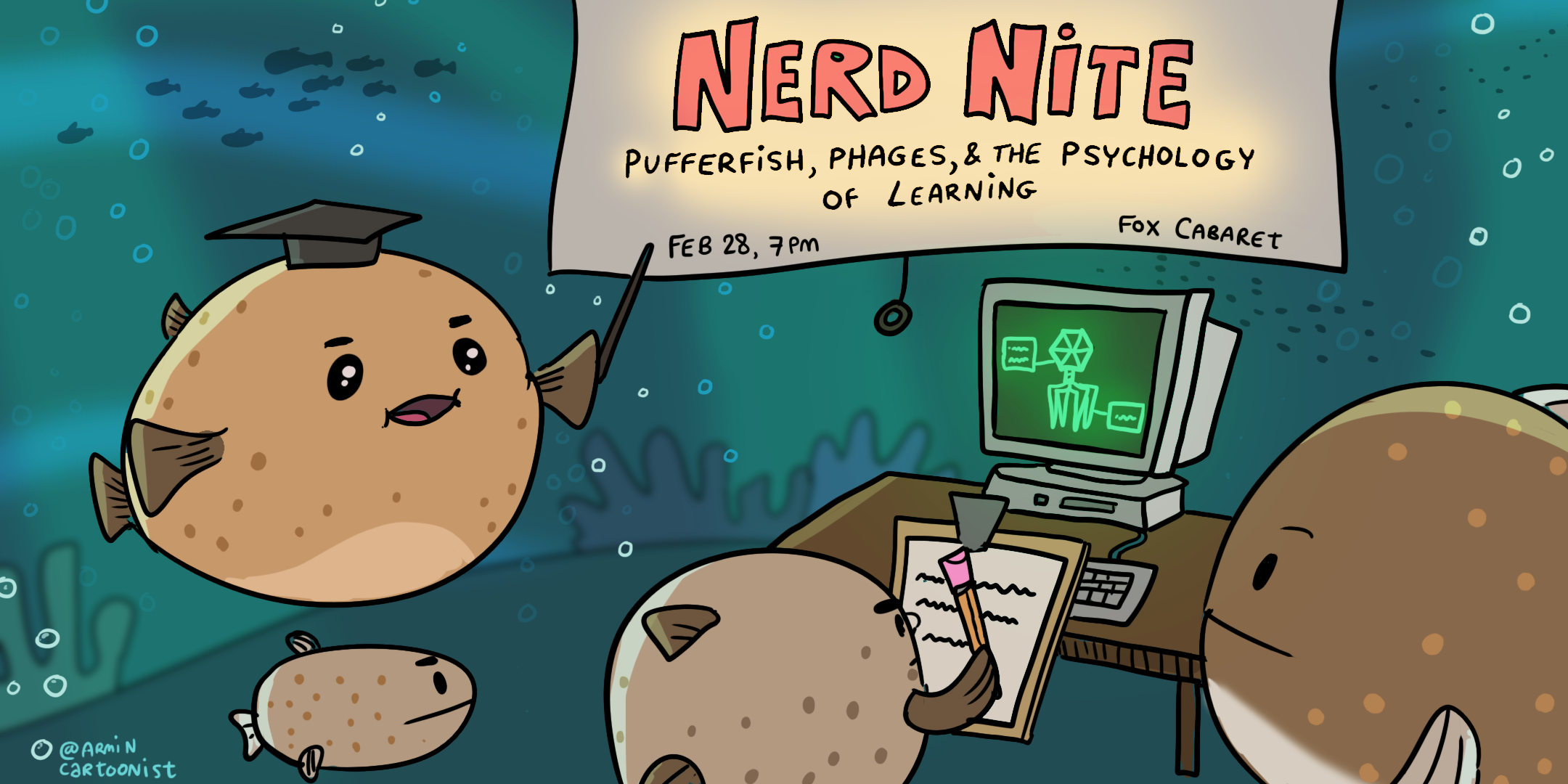Kicking 2024 off with exciting news nerds! We are so excited to present Nerd Nite on the stage again, and this year we’re going to spread out the fun by doing 4 amazing events. If you’ve been with us before, you know how these go, but for those potential Nerd Nite newbies we’re a social evening with talks, and science revelry hosted by the Rat Detective Dr. Kaylee Byers, and Space Michael Unger.
This month we have another talk originally scheduled in that fateful March 2020 in pufferfish! Amy Liu back then was at UBC we had them on Nerdin’ About Season 2 which you can find on your podcasting platforms or read the transcript. Amy has come over from Victoria just to nerd out on pufferfish.
However that’s not the furthest nerd traveller as we one of our favourites from the Beakerhead Science Communication Course at Banff in Miranda Stahn who’s coming from Edmonton to nerd out with us on phages!
Finally Robin Barrett is going to put all of this in perspective with how we learn.
You’re bound to learn something, but most definitely you’ll have a lot of fun. Our first event back sold out quickly so get you tickets while they last!
Hosted by: Kaylee Byers and Michael Unger
Where: The Fox Cabaret
When: Wednesday February 28th; Doors @ 7, show starts @ 7:30
Tickets: Eventbrite
Poster by: Armin Mortazavi

1. Amy Liu – 15 Minutes to Convince you that Pufferfish are Amazing
Everyone has that one interest they won’t stop talking about. For Amy, it’s Pufferfish. Perhaps you’ve seen pictures or videos of Pufferfish eating carrots, or making silly faces, or even as a unique emoji on your phone. But what’s so special about these funny-looking fish? And why do people continue to be fascinated by them? From their deadly toxins, inflatable personalities, their contributions to science, to their surprising intelligence, and even beautiful works of art, by the end of this Nerd Nite, you’ll leave with a new appreciation for these humble fish.
Bio: Hi I’m Amy (They/She), a lover of Science Communication, and self proclaimed Pufferfish enthusiast. I completed my masters in Zoology at UBC on char and trout genetics, and have worked in many science outreach positions including Parks Canada, the Royal Tyrrell Museum of Paleontology, and the Vancouver Aquarium. Currently I work for Fisheries and Oceans Canada using the latest genetic technologies to answer fishy questions. You can find my twitter at @tetraodontidaes
2. Miranda Stahn – Ph-antastic Phage
Bacteriophages (phages) are viruses which exclusively attack bacteria, albeit a boring definition which doesn’t do them justice. These amazing viral entities are the unwritten superheroes of the microbial world. They may hold the key to humanity taking down pressing issues such as antimicrobial resistance, developing cleaner ways of extracting alternative plastics, and having unique ties to human gene editing through CRISPR. In 15 minutes, I want to share why I feel phage is fantastic and why you should too – and if that all fails, I hope to impress you with a dance move or two.
Bio: Miranda (she/her) is an Alberta-based science communicator, writer and STEM professional. She holds a Bachelor’s and Master of Science from the University of Alberta, focusing her academic research on bioengineering and synthetic biology, defending her thesis in 2019, which specifically explored the applications of phage. Outside of work, she is a classically trained ballet and contemporary dancer. She has founded the Fission 2 Fusion Dance project – a science communication initiative that uses dance as a means to communicate science to broader audiences. They can be followed on Instagram as f2fdance.
3. Robin Barrett – Psychology of Learning
Even though studying is perhaps the most important skill to being successful at learning, so few people have ever been shown by their teachers how to study. Likewise, “study hacks” shared on social media are often full of well-intentioned, but misinformed recommendations that don’t have much evidence to support their use. There’s 50+ years of research on how learning, memory, and problem-solving work, but so little of this has made it to the public in the form of usable tools to improve learning right away. In this “greatest hits” style presentation, I’ll introduce “The RISES Principles” which are five of the top skills recommended by leading experts in cognitive and educational psychology, and we’ll cover some of the experiments that have demonstrated their effectiveness. Whatever skills you want to improve, learning more about the RISES principles will help you to study more effectively and efficiently so that you can spend less time working and more time having fun!
Bio: Robin C. A. Barrett (they/them) is a specialist in learning and memory finishing their Masters degree at Simon Fraser University in Psychology where they study how the design of virtual reality learning environments can influence attention and learning. They have worked as an educator both inside academia and in industry for 8 years and have a Certificate in University Teaching and Learning. During their Masters, they spent 3 years as the Teaching Assistant for a cognitive science class on how to study using evidence-based techniques. Inspired by the impact this course had on their students, Robin has been working to bring this material to a wider audience, becoming the Sessional Instructor for that same class while having also spent the last year teaching at high schools across the Greater Vancouver Area and to the general public. If you have ideas on how we can partner up to bring evidence-based learning methods to your community or company, be sure to get in touch!